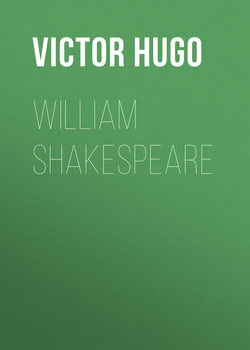Читать книгу William Shakespeare - Victor Hugo, Clara Inés Bravo Villarreal - Страница 11
PART I
MEN OF GENIUS
CHAPTER V
ОглавлениеThe Ex-"Good Taste," that other divine law which has for so long a time weighed on Art, and which had succeeded in suppressing the Beautiful for the benefit of the Pretty, the ancient criticism, not altogether dead, like the ancient monarchy, prove, from their own point of view, the same fault, exaggeration, in those sovereign men of genius whom we have named above. They are exaggerated.
This is caused by the quantity of the infinite that they have in them.
In fact, they are not circumscribed. They contain something unknown. Every reproach that is addressed to them might be addressed to sphinxes. People reproach Homer for the carnage which fills his cavern, the Iliad; Æschylus, for his monstrousness; Job, Isaiah, Ezekiel, Saint Paul, for double meanings; Rabelais, for obscene nudity and venomous ambiguity; Cervantes, for insidious laughter; Shakespeare, for his subtlety; Lucretius, Juvenal, Tacitus, for obscurity; John of Patmos and Dante Alighieri for darkness.
None of those reproaches can be made to other minds very great, but less great. Hesiod, Æsop, Sophocles, Euripides, Plato, Thucydides, Anacreon, Theocritus, Titus Livius, Sallust, Cicero, Terence, Virgil, Horace, Petrarch, Tasso, Ariosto, La Fontaine, Beaumarchais, Voltaire, have neither exaggeration nor darkness nor obscurity nor monstrousness. What, then, fails them? That which the others have.
That is the Unknown.
That is the Infinite.
If Corneille had "that," he would be the equal of Æschylus. If Milton had "that," he would be the equal of Homer. If Molière had "that," he would be the equal of Shakespeare.
It is the misfortune of Corneille that he mutilated and contracted the old native tragedy in obedience to fixed rules. It is the misfortune of Milton that by Puritan melancholy he excluded from his work the vast Nature, the great Pan. It is Molière's failing that, out of dread of Boileau, he quickly extinguishes the luminous style of the "Etourdi;" that, for fear of the priests, he writes too few scenes like "The Poor" in "Don Juan."
To give no occasion for attack is a negative perfection. It is fine to be open to attack.
Indeed, dig out the meaning of those words, placed as masks to the mysterious qualities of geniuses. Under obscurity, subtlety, and darkness you find depth; under exaggeration, imagination; under monstrousness, grandeur.
Therefore, in the upper region of poetry and thought there are Homer, Job, Isaiah, Ezekiel, Lucretius, Juvenal, Tacitus, John of Patmos, Paul of Damascus, Dante, Rabelais, Cervantes, Shakespeare.
These supreme men of genius are not a closed series. The author of All adds to it a name when the wants of progress require it.
